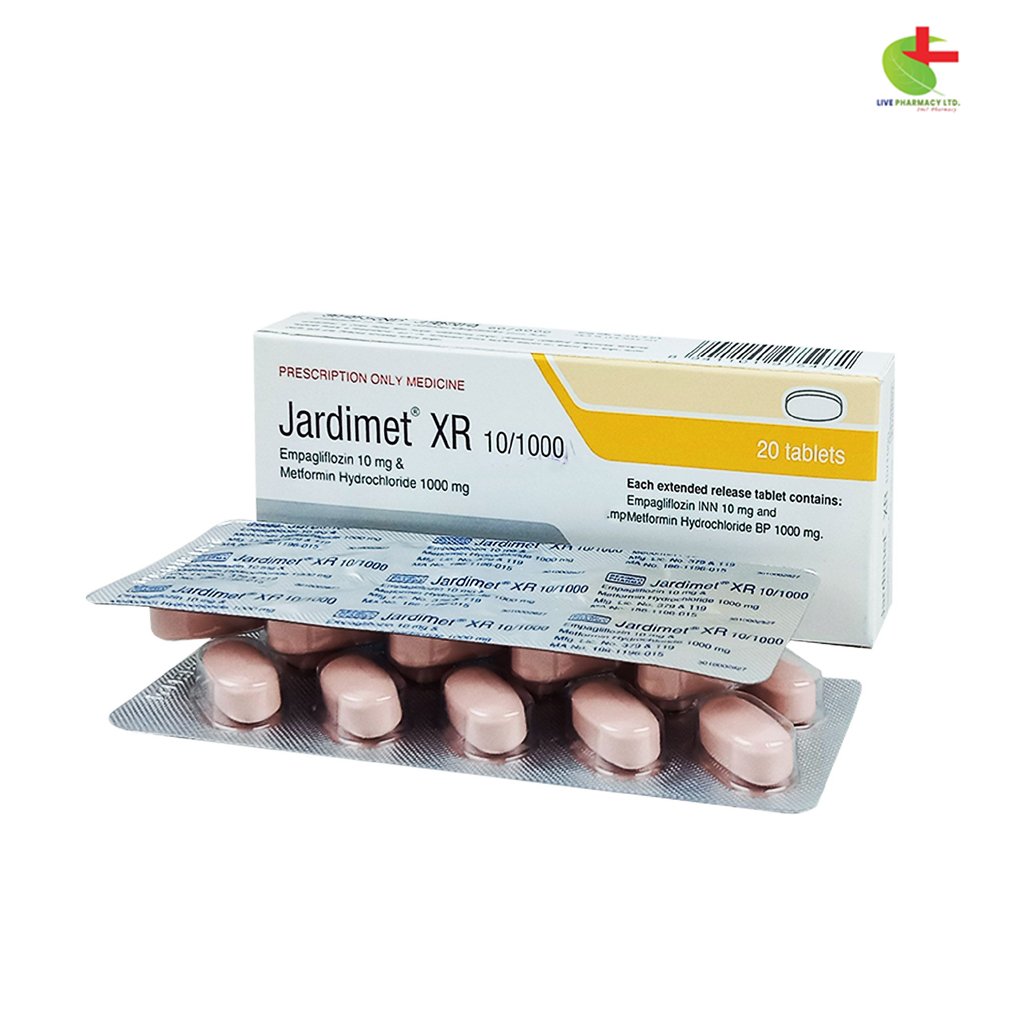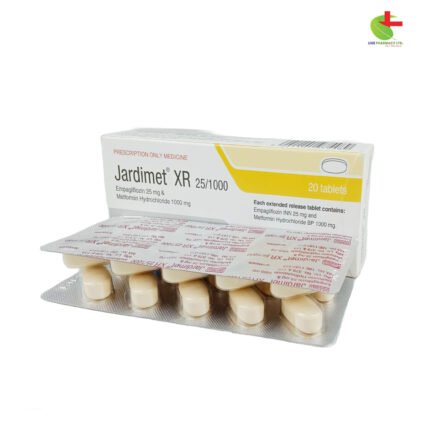Jardimet XR 10/1000
300.00৳ Strip
- Developed by Beximco Pharmaceuticals Ltd. and available through Live Pharmacy
- A combination tablet for managing type 2 diabetes mellitus in adults
- Combines Empagliflozin and Metformin Hydrochloride
- Enhances blood glucose control when diet and exercise are insufficient
- Effective for patients inadequately controlled on Metformin or other diabetes medications
- Reduces glucose reabsorption in the kidneys and improves insulin sensitivity
- Always use as directed by a healthcare provider
 Brand
Brand
|
Beximco Pharmaceuticals Ltd |
|---|---|
 Generics
Generics
|
Empagliflozin + Metformin Hydrochloride |
 Type
Type
|
Tablet |
Indications
Vivori is prescribed for adults with type 2 diabetes mellitus to complement diet and exercise. It is particularly useful for patients who are inadequately controlled on Metformin alone or those who need additional therapy with other diabetes medications. Vivori is also ideal for patients transitioning from separate Empagliflozin and Metformin tablets to a combined form.
Pharmacology
Vivori combines two effective components. Empagliflozin is an SGLT2 inhibitor that prevents glucose reabsorption in the kidneys, leading to increased glucose excretion in the urine. Metformin Hydrochloride, a biguanide, helps lower blood glucose levels by reducing liver glucose production and enhancing insulin sensitivity without causing hypoglycemia.
Dosage & Administration
Vivori should be taken twice daily with meals. The maximum recommended daily doses are 2000 mg of Metformin and 25 mg of Empagliflozin. When switching from Metformin or Empagliflozin, adjust the dose to match the total daily amounts of each component. Extended-release formulations should be taken once daily with meals, with gradual dose escalation to minimize gastrointestinal side effects.
In cases of renal impairment, assess kidney function before initiating Vivori. It should not be used if the estimated glomerular filtration rate (eGFR) is below 45 mL/min/1.73 m². The safety and efficacy of Vivori in individuals under 18 years of age have not been established.
Drug Interactions
Co-administration of Vivori with diuretics can increase urine volume and the risk of volume depletion. Combining Vivori with insulin or insulin secretagogues raises the risk of hypoglycemia. Medications that reduce Metformin clearance may lead to higher levels of Metformin, while carbonic anhydrase inhibitors can increase the risk of lactic acidosis. Excessive alcohol intake can also enhance Metformin’s effects on lactate metabolism.
Contraindications
Vivori should not be used in individuals with hypersensitivity to Empagliflozin or Metformin, acute metabolic acidosis (such as lactic acidosis or diabetic ketoacidosis), severe renal failure (GFR <30 ml/min), or acute conditions that may impair renal function. It is also contraindicated in patients with severe dehydration, shock, or diseases causing tissue hypoxia.
Side Effects
Common side effects include urinary tract infections, genital infections, gastrointestinal symptoms such as diarrhea and nausea, and headaches. Serious reactions can include hypoglycemia when used with insulin or sulphonylureas, and lactic acidosis, which requires immediate medical attention.
Pregnancy & Lactation
The safety of Vivori during pregnancy has not been fully established, particularly in the second and third trimesters. It is not recommended for use while breastfeeding.
Precautions & Warnings
Patients should be monitored for lactic acidosis, hypotension, ketoacidosis, and renal function impairment while on Vivori. There is an increased risk of urinary tract infections, and patients should be observed closely for signs of infection. Regular monitoring is also recommended for potential vitamin B12 deficiency and increased LDL-C.
Overdose Effects
In clinical studies, high doses of Empagliflozin did not show significant toxicity. However, Metformin overdose can lead to lactic acidosis, which requires immediate treatment and possible hemodialysis. The removal of Empagliflozin by hemodialysis has not been studied.
Therapeutic Class
Vivori falls under Combination Oral Hypoglycemic Preparations.
Storage Conditions
Store Vivori below 30°C, away from light and moisture. Keep out of reach of children.













Reviews
There are no reviews yet.